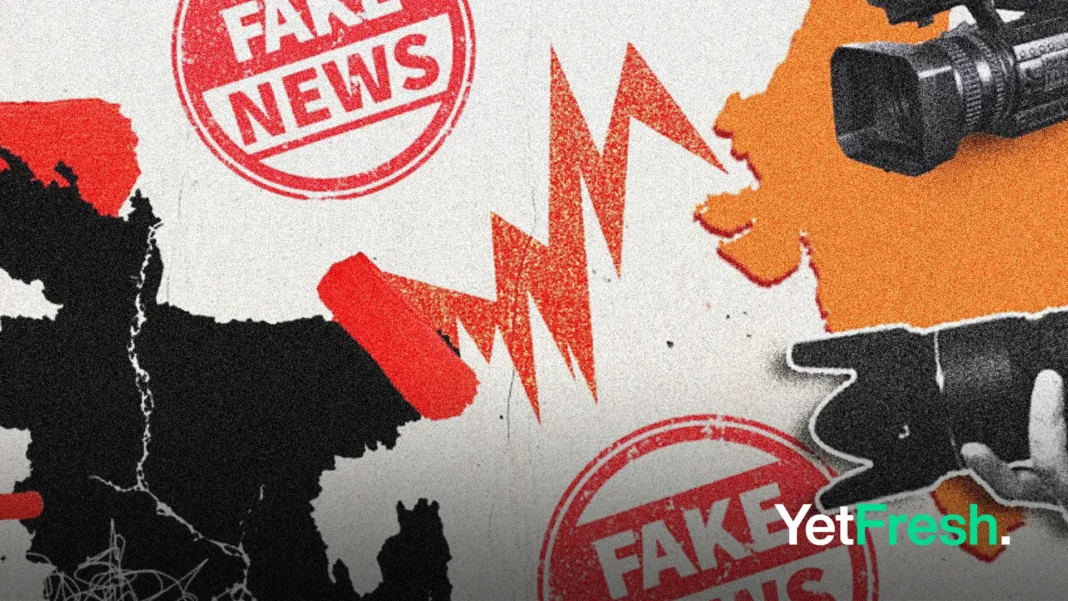Summary:
- Bangladesh is facing a surge in misinformation, primarily from India, threatening political stability and communal harmony.
- The resignation of Sheikh Hasina and the rise of an interim government under Dr. Muhammad Yunus have coincided with increased fake news targeting political and religious communities.
- Misinformation strains Bangladesh-India relations by creating false narratives, potentially impacting diplomatic ties and trade.
- Combating misinformation requires enhancing fact-checking capabilities, improving media literacy, and fostering regional cooperation to maintain stability and positive bilateral relations.
Bangladesh is currently grappling with a surge in misinformation and fake news, much of which is reportedly emanating from India. This disinformation wave threatens to destabilize Bangladesh’s political landscape and incite communal tensions. Addressing this issue is crucial for maintaining national stability and fostering positive relations between the two countries.
The political climate in Bangladesh has been turbulent following the resignation of former Prime Minister Sheikh Hasina and the installation of an interim government led by Dr. Muhammad Yunus. This transition has been accompanied by a significant increase in misinformation, with narratives targeting both political figures and religious communities. The misinformation often exaggerates or fabricates events, such as alleged attacks on minority groups, to fuel unrest and distrust within the country.
Historically, Bangladesh and India have shared a complex relationship, marked by cooperation and occasional tension. Misinformation campaigns can exacerbate these tensions by creating false narratives that strain diplomatic ties. For instance, fake news stories about communal violence can lead to diplomatic protests or affect bilateral trade agreements.
Misinformation in Bangladesh primarily spreads through social media platforms like Facebook and X (formerly Twitter), as well as through mainstream media outlets. Reports indicate that a significant portion of this disinformation is being propagated by accounts based in India, some of which are linked to mainstream Indian media. These accounts have been responsible for spreading false narratives about communal violence and political instability in Bangladesh.
Social media algorithms often amplify sensational content, making it easier for misinformation to reach a wide audience quickly. This rapid spread can make it difficult for fact-checkers to debunk false claims before they are widely believed.
The spread of fake news has exacerbated existing tensions within Bangladeshi society. Misinformation campaigns have targeted religious minorities, portraying them as victims of widespread violence, which has been largely debunked by fact-checking organizations. These narratives not only misrepresent the situation on the ground but also threaten to incite further violence and division among communities.
For example, false reports of attacks on Hindu temples have circulated widely on social media, leading to fear and mistrust among religious communities. Such misinformation can provoke real-world violence, as individuals react to perceived threats against their community.
To combat the spread of misinformation, it is crucial to enhance the capacity of fact-checking organizations like Rumor Scanner and Dismislab. These groups play a vital role in debunking false claims and providing accurate information to the public. Increasing their reach and resources can help ensure that misinformation is quickly identified and corrected.
Fact-checking organizations can collaborate with social media platforms to flag false information more effectively. By working together, they can develop algorithms that identify potential misinformation before it gains traction.
Improving media literacy among the Bangladeshi population is essential for empowering individuals to critically evaluate information sources. Educational campaigns can teach people how to identify credible news outlets, verify information before sharing it, and recognize common tactics used in misinformation campaigns. Such efforts can reduce the impact of fake news on public perception.
Schools and universities can incorporate media literacy into their curricula, ensuring that future generations are equipped with the skills needed to navigate an increasingly complex information landscape.
The Bangladeshi government can take several steps to address the issue of misinformation. These include engaging diplomatically with Indian authorities to address cross-border disinformation campaigns and establishing dedicated task forces to monitor and respond to fake news. Additionally, implementing stricter regulations on social media platforms could help curb the spread of false information.
Government agencies can also work with international organizations to develop best practices for combating misinformation, drawing on successful strategies from other countries.
Diplomatic engagement with India is crucial for addressing the root causes of misinformation. Both countries need to collaborate on establishing protocols for verifying information before it spreads across borders. This could involve setting up joint fact-checking initiatives or bilateral agreements to tackle misinformation at its source.
Regular dialogues between Bangladeshi and Indian officials can help build trust and facilitate cooperation in addressing shared challenges related to misinformation.
Encouraging regional cooperation among South Asian countries can also be beneficial. By sharing resources and strategies, these nations can collectively address the challenges posed by misinformation. This could include regional workshops or conferences focused on best practices for combating fake news.
Organizations such as SAARC (South Asian Association for Regional Cooperation) could play a pivotal role in facilitating these efforts, providing a platform for member countries to collaborate on solutions.
Addressing fake news is essential for maintaining stability in Bangladesh and fostering positive relations with India. It requires a concerted effort from governments, media organizations, and civil society to work together in combating misinformation. By strengthening fact-checking initiatives, enhancing media literacy, and engaging in regional cooperation, Bangladesh can effectively counteract the challenges posed by fake news propaganda.
In conclusion, tackling misinformation is not just a national issue but a regional one that requires cooperation across borders. By taking proactive steps now, Bangladesh can safeguard its society against the harmful effects of fake news while promoting peace and understanding within South Asia.




